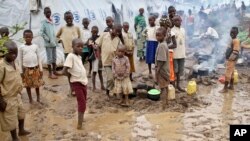Burundians are "voting with their feet" as pre-election violence in their country escalates. The U.N. refugee agency reports more than 50,0000 people have fled in fear to neighboring countries during the last several weeks and this seemingly unstoppable flow is increasing.
The U.N. agency says it is worried that one of the most promising refugee return and integration programs in Africa could unravel because of the crisis in Burundi.
Burundi’s decade-long civil war, which ended in 2005, sent hundreds of thousands of refugees fleeing to neighboring countries. After peace returned, the UNHCR helped almost one-half million of them return to their homes.
Neighboring Tanzania not only has played host to many of these refugees, but is also sheltering large numbers of Burundians who had fled violence in 1972. U.N. refugee spokesman Adrian Edwards says in recent years, Tanzania has offered citizenship to some 200,000 of these refugees and their descendants. He says this is the largest refugee integration program ever enacted by a host country.
“Since the eruption of pre-election violence in mid-April, however, there have been alarming signs that this progress is being undone," he said. "Over the last weeks more than 50,000 Burundians have fled to Rwanda, Tanzania and Democratic Republic of the Congo. Many of these have crossed into Rwanda, but over the last week we have also seen a big increase in people seeing asylum in Tanzania after entry restrictions there were lifted. In addition, almost 8,000 people have crossed into South Kivu province in DRC.”
Violent clashes between police and protesters broke out in mid-April after Burundian President Pierre Nkurunziza, who has been in power since 2005, announced he was planning to seek a third term. Opponents say this violates the terms of the 2000 Arusha Peace and Reconciliation Agreement that limits the president to two terms.
Opponents are calling for the June 26 presidential elections to be postponed. Although the African Union supports this demand, President Nkurunziza shows no signs of backing down.
UNHCR spokesman Edwards says a majority of the refugees are women and children, including a large number of unaccompanied children. He tells VOA many of these people tell aid workers that they have experienced difficulties while trying to leave Burundi.
"What I have been saying in Burundi is that people have difficulties because of the security situation," he said. "What we are hearing is roadblocks, multiple roadblocks, women, in particular having problems getting passed these — threats of rape and other problems. Borders at the moment are open to other countries. But, it is vital they remain so. People fleeing violence and fear of violence clearly need access to safe havens.”
Meanwhile, the World Food Program warns the political crisis in Burundi could lead to a humanitarian crisis. Right now, the WFP says it is providing food and nutrition to more than 25,000 Burundian refugees in Rwanda. The WFP says it and its partners are preparing to assist up to 100,000 refugees in Rwanda if necessary.




